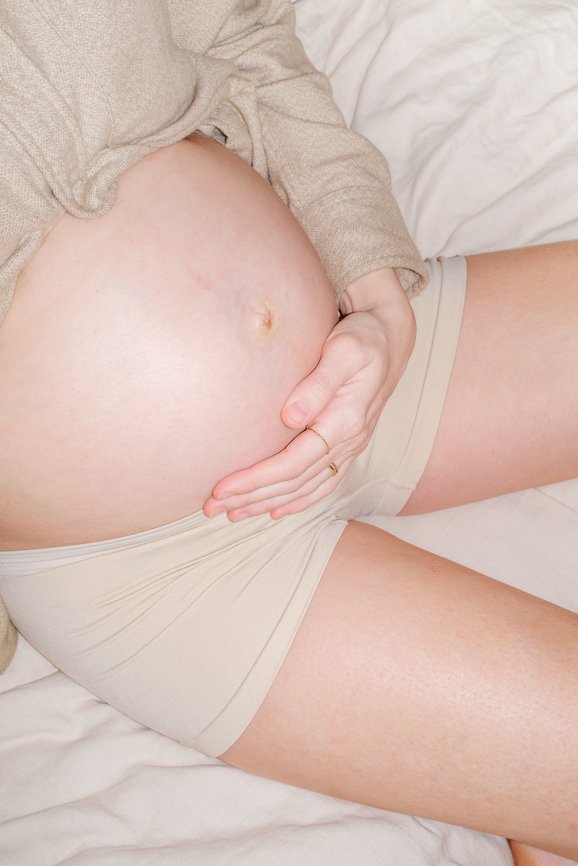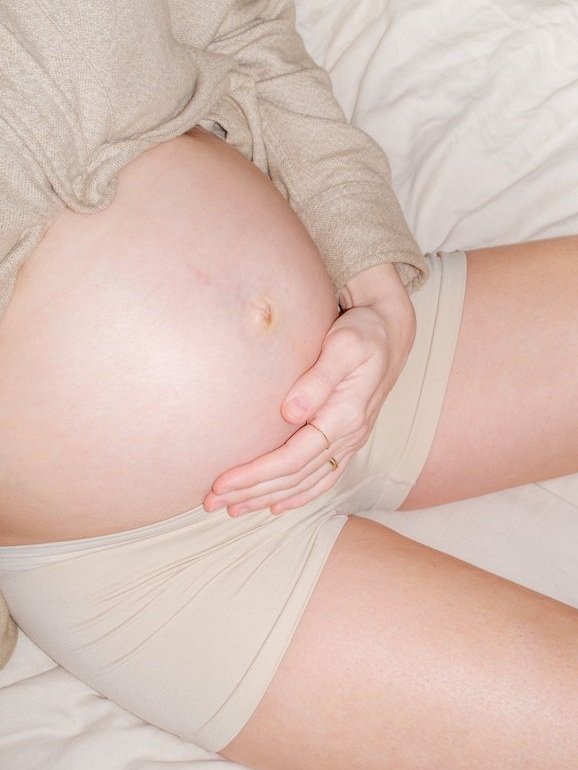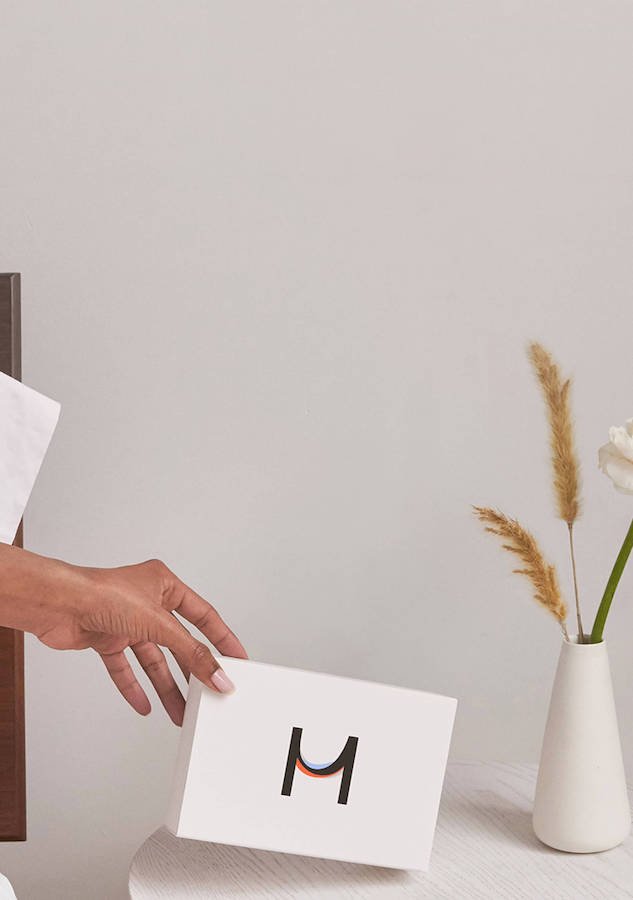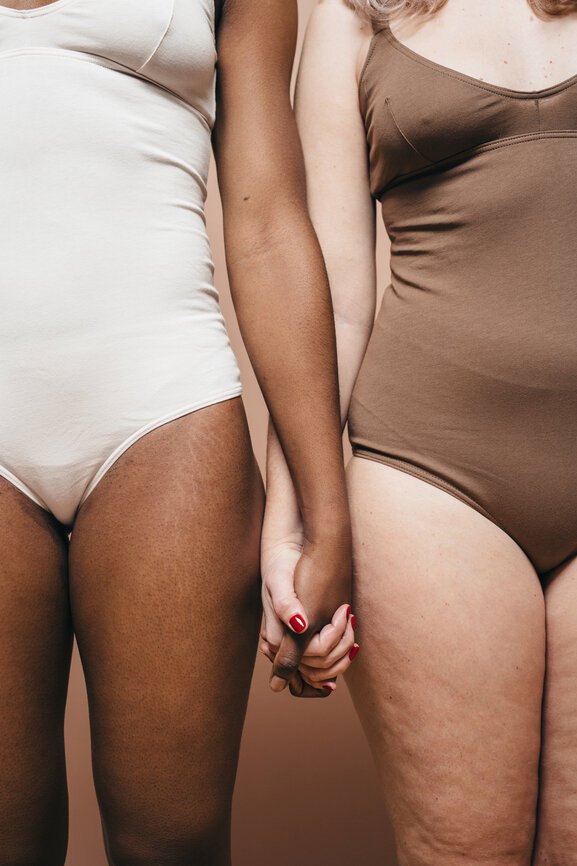
How I Dealt With Body Changes During Pregnancy After Recovering From An Eating Disorder
I’m learning to love my body again as it changes throughout pregnancy.
This essay includes language related to eating disorders and is one writer’s experience. If you are experiencing similar thoughts and need support or resources, please contact the NEDA Helpline.
In the fall of 2021, two weeks after learning I was pregnant, my body began to feel out of control for the first time in years. I was less than a decade away from a hard battle with an eating disorder—one that had manifested in my teens and early 20s. Now that I was pregnant at 31, I watched as two vastly different realities collided: a feeling of pure joy and shock and a sudden, slightly destabilizing realization that my body was rapidly changing in ways I couldn’t understand.
Like so many other pregnant people, I slogged my way through the first trimester, experiencing intense physical symptoms as my body surged with the hormones needed to simultaneously grow a fetus and a new organ—the placenta. After a particularly challenging week, I walked by a mirror and was repulsed by my reflection; I felt detached from my body, which was miraculously going through a kaleidoscope of changes to nurture a beautiful, growing life.
But I couldn’t make that connection just yet—and my own relentless critique of my appearance returned. I was fatigued, bloated, and none of my clothes seemed to fit. I didn’t have the cute bump or “glowing” appearance of a happy, perfectly coiffed pregnant goddess that was marketed to me in every media advertisement. Constant nausea and wild mood swings kept me from doing the physical activity that reminded me to love and appreciate my body, not to mention provide a boost of much-needed endorphins. I didn’t feel capable of hopping on my bike, going for a surf, or even on a walk through local trails.
“I didn’t have the cute bump or ‘glowing’ appearance of a happy, perfectly coiffed pregnant goddess that was marketed to me in every media advertisement.”
Feeling sick, tired, and lonely, I desperately searched for control. Memories I thought I had forgotten—restricted and binge eating, obsessive workouts, and secret self-loathing—crept back in. What was this desire to control or manipulate my outer appearance to make myself feel better on the inside? Would it symbolize that I had it all together when I felt like I was falling apart?
While I knew that I was on the cusp of a wild new chapter, in which I wouldn’t just meet my baby but a different version of myself, I also realized how complex of a transition it would be. I wanted to be pregnant and bodily changes should come as no surprise, but losing that sense of self and, moreover, a sense of stability was really, really hard.
It dawned on me that I had been in this liminal place of not knowing a decade ago while struggling with my eating disorder. I sensed that this new seismic shift that triggered the tsunami wave of emotions was similar to how I felt then—vulnerable, scared, and confused. I decided to turn to Dialectal and Cognitive Behavior Therapy (DBT and CBT), the skills that I learned to heal my eating disorder; they had carried me through before, and I knew they could carry me through again.
“I started with the most simple yet profound action: radical acceptance.”
I started with the most simple yet profound action: radical acceptance—the premise is to tolerate pain or discomfort without labeling it as good or bad but to simply acknowledge and stop fighting it. I had been spinning my wheels for so long, wasting my energy, and refusing to accept the reality that with this amazing new journey comes some pain in letting go of what I once knew.
Yes, I loved the place I had been in before pregnancy, and yes, part of me was scared of losing that version of my life I had come to know and love so much.
But I could also make peace with the fact that I didn’t have to look or feel like the old me or immediately transform into the glowing new me for things to be alright as they were. I could just be here, in the middle of it all and be open to the idea that I could learn new ways to be resilient when changes inevitably rock my world once more (um, hello, parenthood!). The pressure valve slowly released.
Since things felt overwhelming (and honestly, I was just trying to get through the day without throwing up), the next tool I used was to do one thing at a time. Simply give yourself permission to take however long you need to complete a single task. OK, got it.
“Productivity definitely looked different, but the tiny victories were just as sweet.”
Productivity definitely looked different, but the tiny victories were just as sweet. I downsized my list of “to-dos” to what felt manageable for that day and relished each accomplishment; I got on my yoga mat for 10 minutes and didn’t worry about “getting in a workout.” I let the house get a little messy and disorganized, and miraculously no one died. Before long, I started to become proud of this newfound strength.
Perhaps I had gained more confidence, but I was surprised to find this last one came so easily: self-soothing through relaxation. Persistent stress could keep your mind and body in a state of high alert and fear, which wasn’t serving me well. Although I had learned it years ago, as an adult, I struggled to allow myself time for relaxing because I was concerned I was being lazy or not doing enough.
In reality, the body is working incredibly hard during the first trimester to grow an extra organ that will provide nutrients to the baby, hence the fatigue. With that in mind, I embraced it all and took naps, bought some comfy clothes that fit better, enjoyed hot baths, practiced restorative yoga, and occasionally just did nothing—guilt-free. After some time, I reveled in relaxing and noticed that I began to feel comfortable in my own skin again.
I had once read an article that explained how a pregnant person’s efforts towards health and wellbeing are seen as a gift to their baby, who will also receive those benefits. Finally, it all clicked. It didn’t matter where I was on this nonlinear journey. By loving myself, I was also loving my growing baby.
“By loving myself, I was also loving my growing baby.”
When it comes down to it, all the superficial things, our appearance, our ego, our sense of control over life don’t make for a solid foundation when our worlds start to shake. Some of the most comforting advice I received was from a new mom who told me that she loved her little one yet did not enjoy her pregnancy. And that was okay. Just like I learned so many years ago and continue to learn over and over again, struggling isn’t something to be ashamed of, nor is getting hung up on an unrealistic goal of surface-level perfection to pretend it doesn’t exist.
Our struggles are humbling reminders that we are more resilient than we give ourselves credit for. This was true for me nearly 10 years ago, and it is still true for me as I return to these basic principles of self-love and care today.
As I round the corner of my third trimester, everything and nothing has changed. When people notice my protruding belly and ask how I’m doing, I think about where I’ve come from and what is ahead and answer with a laugh, “Every day is an adventure.”
“Our struggles are humbling reminders that we are more resilient than we give ourselves credit for.”
Katherine Englishman is a freelance writer based in beautiful southern Maine with her growing family. She focuses on travel, design, sustainability, and lifestyle, and has written for Outside Online, Field Mag, Food52, Maine Magazine, and Mother Mag, among others.




